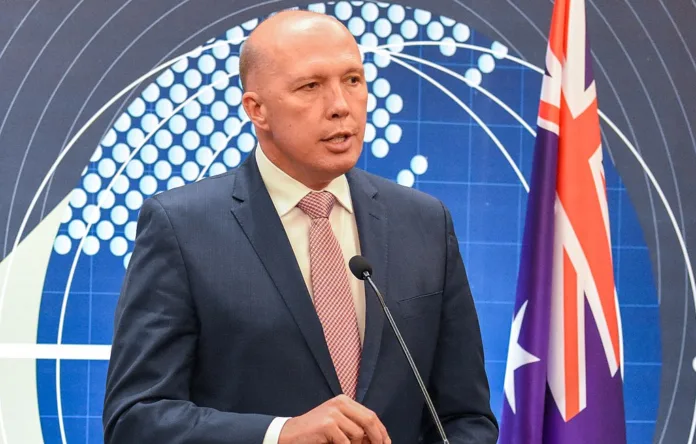The opposition leader deflects Treasurer’s criticisms, accusing labour of avoiding economic failures and internal discord
Opposition Leader Peter Dutton has strongly rebutted Treasurer Jim Chalmers’ harsh critique, which labelled him as “divisive” and “dangerous,” following a heated exchange on Australian political discourse. The clash centres around Chalmers’ annual John Curtin Oration delivered on Monday night, where he accused Dutton of fueling cultural conflicts and positioning him as the most divisive leader in Australia’s recent history.
In his oration, Chalmers condemned Dutton for allegedly exacerbating societal divisions through his political strategies. The Treasurer emphasized that Dutton’s approach is not accidental but a deliberate tactic to heighten divisions rather than promote unity. Chalmers described Dutton’s style as “almost pathological” and warned that such leadership could have perilous consequences for the nation.
Embed from Getty ImagesChalmers intensified his criticism on Tuesday during an appearance on ABC’s Radio National program. He asserted that Dutton’s divisive rhetoric poses a serious threat to the country’s stability, suggesting that such leadership should disqualify him from holding the top political office. “Peter Dutton is the most divisive political leader that I’ve seen in my lifetime,” Chalmers said, asserting that this deliberate choice to incite division is not only disappointing but dangerous for Australia’s future.
This verbal confrontation comes amidst a broader debate regarding immigration policies, particularly surrounding Palestinian visas. Dutton has been vocal about his stance on restricting visas from Gaza, demanding robust security vetting processes before any approvals. His position has drawn significant backlash and further fueled the ongoing debate over immigration and security.
Dutton dismissed Chalmers’ character assessment as a diversion from Labor’s economic shortcomings. Speaking to reporters, Dutton challenged Chalmers to provide evidence for his claims, questioning why Chalmers would focus on him if the economy were thriving. “If Australians were doing so well and the economy was running as great as Jim Chalmers claims it is, why is he dedicating the speech to me?” Dutton argued. He accused the Treasurer and the Labor Party of using him as a scapegoat to distract from their own failings.
Dutton also criticized Labor for internal discord, highlighting that despite Prime Minister Anthony Albanese’s agreement with Chalmers’ views, there is visible division within the party itself. The Liberal leader pointed to recent statements by Labor figures such as Tony Burke as indicative of a party preoccupied with internal issues rather than addressing national concerns.
Chalmers’ remarks reflect ongoing tensions in Australian politics, where debates over leadership, economic management, and immigration policies intersect. The opposition leader’s response underscores a contentious political environment marked by sharp critiques and strategic manoeuvres on both sides of the aisle.
Analysis
Political: The confrontation between Peter Dutton and Jim Chalmers highlights significant political friction within Australian politics. Chalmers’ accusations against Dutton reflect broader concerns about leadership styles and the impact of political rhetoric on national unity. Dutton’s rebuttal reveals a strategic counterattack aimed at deflecting attention from the economic challenges facing the Labor government. This political skirmish underscores the volatility of Australian politics, where leaders’ public personas and their handling of contentious issues can significantly influence public perception and political capital.
Social: The clash between Dutton and Chalmers mirrors deeper societal debates about leadership and division. Chalmers’ characterization of Dutton as a divisive figure resonates with concerns about political discourse and its effects on social cohesion. Dutton’s response, focusing on the Labor government’s economic performance, reflects a broader social frustration with perceived governmental inefficacy. This dynamic illustrates how political conflicts can reflect and exacerbate underlying social tensions and issues of trust in leadership.
Racial: Although not the primary focus, the debate over immigration policies, particularly concerning Palestinian visas, intersects with racial and ethnic considerations. Dutton’s stance on security vetting for Gaza-based applicants raises questions about how immigration policies are shaped by and impact racial and ethnic communities. Chalmers’ comments, while not explicitly addressing racial issues, contribute to the broader discourse on how leadership addresses or exploits racial and ethnic divisions.
Gender: Gender dynamics are not prominently featured in this political dispute. However, the roles and responses of both Chalmers and Dutton in the public sphere could influence perceptions of their leadership capabilities and effectiveness. The absence of gender-specific commentary does not diminish the importance of inclusive leadership but highlights that the current debate is more focused on political strategy and economic performance.
Economic: The economic context is central to the dispute between Dutton and Chalmers. Dutton’s criticism of Chalmers’ focus on personal attacks rather than economic issues highlights the ongoing concern about economic management. The Treasurer’s remarks on Dutton’s divisiveness may serve as a distraction from broader economic challenges, including inflation, employment, and growth. This political exchange reflects the high stakes of economic performance in shaping political narratives and public trust.
